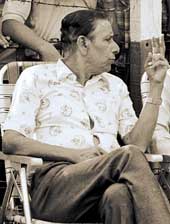 |
| A file picture of Byomkesh Bose during a visit to the Maidan |
Calcutta: One of the pillars of Indian football, Byomkesh Bose is no more. The stalwart defender, aged 76, breathed his last after a heart attack at his residence on Friday. He was declared brought dead at the B.M. Birla Heart Research Institute at 3.45 am. Bose had represented India at the 1952 Olympics in Helsinki.
His last rites were carried out at the Keoratala Burning Ghat.
Bose, who had a pacemaker for the last 12 years, was suffering from a cold for the past few days.
According to his close associate at the East Bengal (where he played from 1948-58) and India teams, Paltu Roy, the news came as a shock.
“I even talked to Byomkesh’da yesterday and he sounded quite okay. His son gave me the news this morning and I still can’t quite believe it,” Roy said.
Describing Bose as a great friend, Roy said: “I was junior to him. He guided not just me, but all his juniors in the East Bengal as well as the Indian team.”
Recalling an exhibition match against Linz XI in Austria while returning from the Helsinki Olympics, Roy said: “The team had about eight Austrian Olympians. We won the match 4-1 and Byomkesh’da was the pillar in our defence.”
However, in the 1952 Olympics, Bose played in their preliminary round match against United States which Indian won, but “strangely got dropped in the game against Yugoslavia”.
“We lost the game 1-10, but it still is a mystery why a player like Byomkesh Bose was not included,” Roy said.
“He also had a number of memorable games for East Bengal, one that immediately comes to mind is the IFA Shield final against Mohun Bagan in 1951.
“After the first-leg ended goalless, we won 2-0 in the second leg, Saleh scoring both the goals within the first 10 minutes. In that game, Byomkesh’da, who was the captain, did not allow anything to go past him,” Roy added.
It was under the captaincy of Bose that season East Bengal won their first Durand Cup as well. After returning from the 1952 Olympics, Bose got too involved with his official duties.
“He couldn’t devote too much time for the club. But he still played some matches and continued till 1958,” he added.
Nikhil Nandy, one of his contemporaries, felt that had he been able to devote more time to football after 1952, he could have gone to even greater heights.
“Still, he was a superb defender and it was never easy to go past him,” Nandy said.










